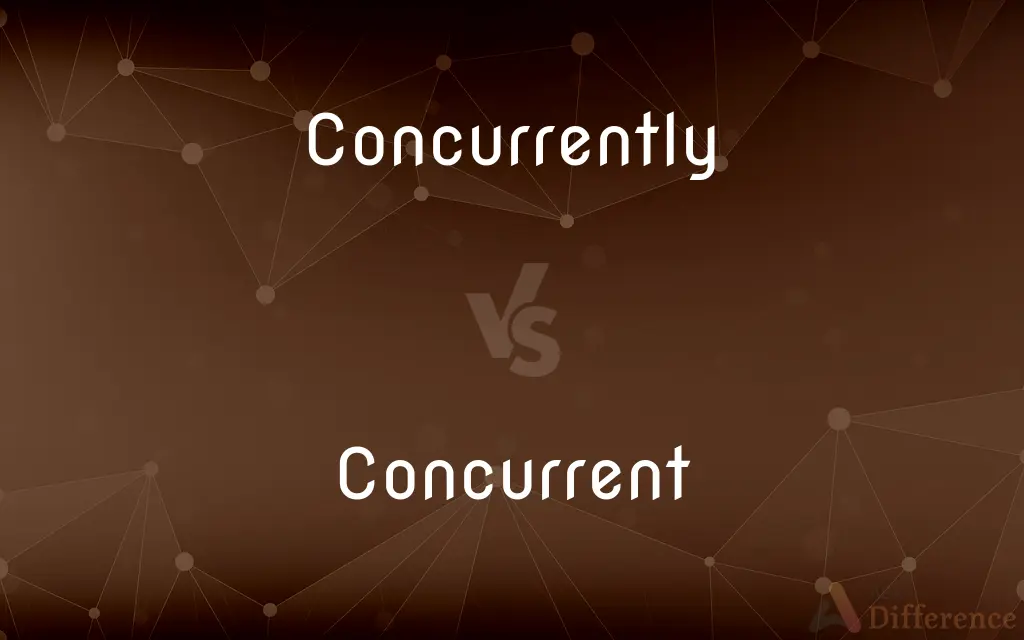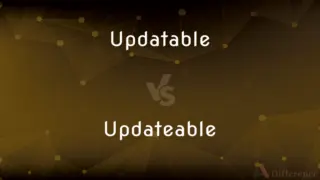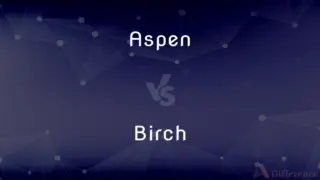Concurrently vs. Concurrent — What's the Difference?
By Tayyaba Rehman — Updated on October 12, 2023
"Concurrently" means at the same time, whereas "Concurrent" means occurring or existing simultaneously. The former is an adverb describing an action, while the latter is an adjective describing things that are simultaneous.

Difference Between Concurrently and Concurrent
Table of Contents
ADVERTISEMENT
Key Differences
In the realm of language, "Concurrently" serves as an adverb, denoting the simultaneous occurrence of events or actions. "Concurrent," on the other hand, presents itself as an adjective, illustrating objects or events that unfold simultaneously. The distinct grammatical roles of the words are pivotal to understanding their correct usage in sentences, even though both point towards simultaneousness.
"Concurrently" directly modifies verbs, informing us about the manner in which an action takes place. Contrastingly, "Concurrent" modifies nouns, illustrating a characteristic of entities or occurrences. The first signals how something is done, while the latter delineates a trait or characteristic of something. Their roles in sentence construction, therefore, cannot be swapped without altering sentence validity and meaning.
The sentences "The conferences were held concurrently" and "The conferences were concurrent" exemplify subtle distinction. The former explicitly details how the conferences were held, whereas the latter simply describes the conferences. Both words, while synonymous, carve out their unique niches in linguistic expression, underscoring the importance of accurate word selection.
Leveraging "Concurrently," we can generate phrases like "The trains arrived concurrently," placing focus on the action of arriving. Using "Concurrent," one might say, "The trains had concurrent arrival times," drawing attention to the attribute of the arrival times. Both words permit the description of simultaneous events, yet their usage is shaped by the particular syntactical and semantical needs of a sentence.
In software development, "concurrently" could depict actions or processes running in tandem, while "concurrent" might describe systems or algorithms that permit such simultaneous running. In these distinct yet related spheres, both words illuminate aspects of simultaneity but apply to different facets of the situation or entities involved.
ADVERTISEMENT
Comparison Chart
VPart of Speech
Adverb (modifies verbs)
Adjective (modifies nouns)
Usage in a Sentence
The events occurred concurrently.
The events were concurrent.
Meaning
At the same time
Existing or happening at the same time
Example with "events"
"Events were held concurrently."
"Concurrent events were held."
Synonym
Simultaneously
Simultaneous
Compare with Definitions
Concurrently
In a parallel manner.
They worked concurrently on the project.
Concurrent
In unison or simultaneously.
Concurrent voices echoed in harmony.
Concurrently
At the same time.
The two shows were broadcast concurrently.
Concurrent
Occurring at the same time.
The concurrent events caused traffic.
Concurrently
Simultaneously.
The courses ran concurrently.
Concurrent
Operating or occurring simultaneously.
There were concurrent discussions in the forum.
Concurrently
In a coinciding manner.
The stars aligned concurrently.
Concurrent
Running parallel.
The concurrent investigations were unrelated.
Concurrently
Existing or happening at the same time.
The meetings were scheduled concurrently.
Concurrent
Coexisting.
The concurrent symptoms confused the doctors.
Concurrently
Happening, existing, or done at the same time as something else
Dealing with concurrent crises.
Concurrent
Happening, existing, or done at the same time as something else
Dealing with concurrent crises.
Concurrently
Meeting or tending to meet at the same point; convergent
Concurrent lines.
Concurrent
Meeting or tending to meet at the same point; convergent
Concurrent lines.
Concurrently
Being in accordance; harmonious
Are these decisions concurrent with university policy?.
Concurrent
Being in accordance; harmonious
Are these decisions concurrent with university policy?.
Concurrently
In a concurrent manner; at the same time
Concurrent
Happening at the same time; simultaneous.
Concurrently
With concurrence; unitedly.
Concurrent
Belonging to the same period; contemporary.
Concurrently
Overlapping in duration;
Concurrently with the conference an exhibition of things associated with Rutherford was held
Going to school and holding a job at the same time
Concurrent
Acting in conjunction; agreeing in the same act or opinion; contributing to the same event or effect.
Concurrent
Joint and equal in authority; taking cognizance of similar questions; operating on the same objects.
The concurrent jurisdiction of courts
Concurrent
(geometry) Meeting in one point.
Concurrent
Running alongside one another on parallel courses; moving together in space.
Concurrent
Designed to run independently, rather than sequentially, using various mechanisms, such as threads, event loops or time-slicing.
Concurrent
One who, or that which, concurs; a joint or contributory cause.
Concurrent
One pursuing the same course, or seeking the same objects; hence, a rival; an opponent.
Concurrent
One of the supernumerary days of the year over fifty-two complete weeks; so called because they concur with the solar cycle, the course of which they follow.
Concurrent
One who accompanies a sheriff's officer as witness.
Concurrent
Acting in conjunction; agreeing in the same act or opinion; contributing to the same event or effect; coöperating.
I join with these laws the personal presence of the kings' son, as a concurrent cause of this reformation.
The concurrent testimony of antiquity.
Concurrent
Conjoined; associate; concomitant; existing or happening at the same time.
There is no difference the concurrent echo and the iterant but the quickness or slowness of the return.
Changes . . . concurrent with the visual changes in the eye.
Concurrent
Joint and equal in authority; taking cognizance of similar questions; operating on the same objects; as, the concurrent jurisdiction of courts.
Concurrent
Meeting in one point.
Concurrent
One who, or that which, concurs; a joint or contributory cause.
To all affairs of importance there are three necessary concurrents . . . time, industry, and faculties.
Concurrent
One pursuing the same course, or seeking the same objects; hence, a rival; an opponent.
Menander . . . had no concurrent in his time that came near unto him.
Concurrent
One of the supernumerary days of the year over fifty-two complete weeks; - so called because they concur with the solar cycle, the course of which they follow.
Concurrent
Occurring or operating at the same time;
A series of coincident events
Common Curiosities
Is "Concurrent" synonymous with simultaneous?
Yes, "Concurrent" can be synonymous with simultaneous.
Can "Concurrently" and "Concurrent" be used interchangeably?
Not always, as they are different parts of speech and used in different contexts.
Is "Concurrently" an adverb?
Yes, "Concurrently" is an adverb.
Can "Concurrent" be used to describe how an action is performed?
No, "Concurrent" describes a characteristic, not a manner of action.
Does "Concurrently" mean at the same time?
Yes, "Concurrently" means at the same time.
Can "Concurrent" describe future events?
Yes, "Concurrent" can describe events that will happen at the same time in the future.
What part of speech is "Concurrent"?
"Concurrent" is an adjective.
Can "Concurrently" modify a noun?
No, "Concurrently" modifies verbs, not nouns.
Is "Concurrently" used in specific fields?
"Concurrently" is widely used but can be particularly common in legal and technical contexts.
Can "Concurrent" describe events in the past?
Yes, "Concurrent" can describe simultaneous events, regardless of when they occurred.
Is "Concurrently" suited for formal writing?
Yes, "Concurrently" is suitable for both formal and informal writing.
Does "Concurrent" imply any causal relationship?
No, "Concurrent" only indicates simultaneity, not causality.
Can "Concurrently" be used in legal contexts?
Yes, "Concurrently" is often used in legal writing to describe simultaneous occurrences.
Is it correct to say "two things happened concurrently"?
Yes, it denotes that two things happened at the same time.
Can "Concurrent" be used in scientific writing?
Yes, "Concurrent" is used in various fields, including scientific writing, to describe simultaneous phenomena.
Share Your Discovery

Previous Comparison
Updatable vs. Updateable
Next Comparison
Aspen vs. BirchAuthor Spotlight
Written by
Tayyaba RehmanTayyaba Rehman is a distinguished writer, currently serving as a primary contributor to askdifference.com. As a researcher in semantics and etymology, Tayyaba's passion for the complexity of languages and their distinctions has found a perfect home on the platform. Tayyaba delves into the intricacies of language, distinguishing between commonly confused words and phrases, thereby providing clarity for readers worldwide.
















































